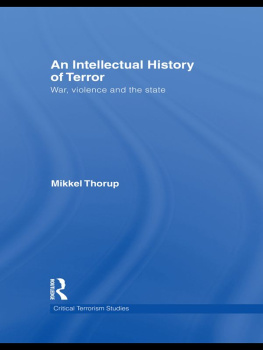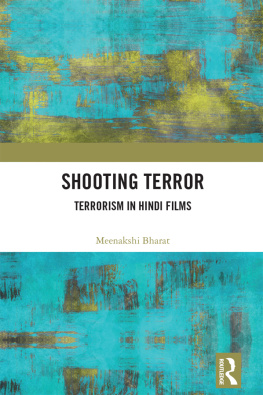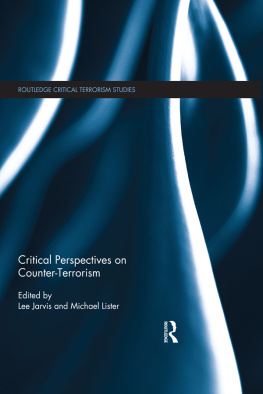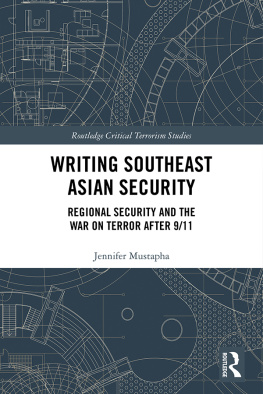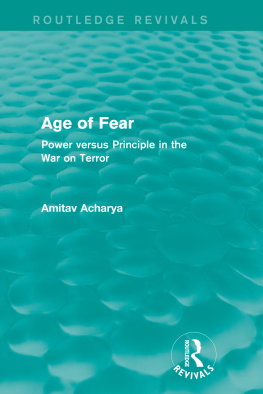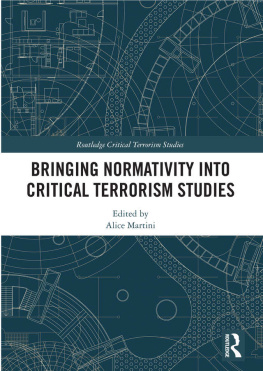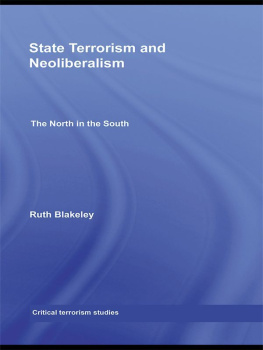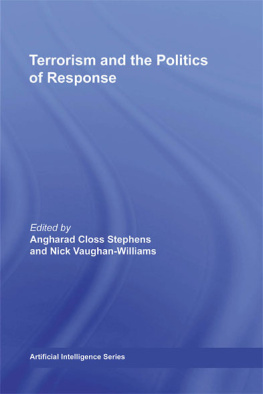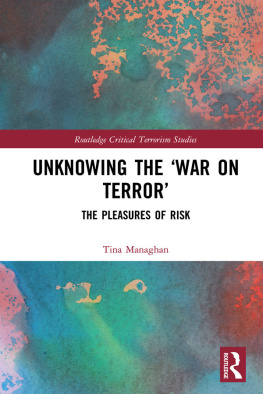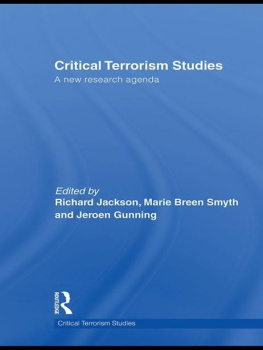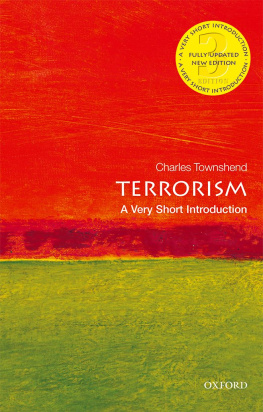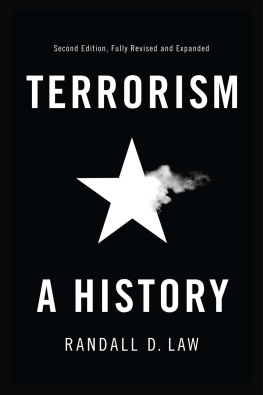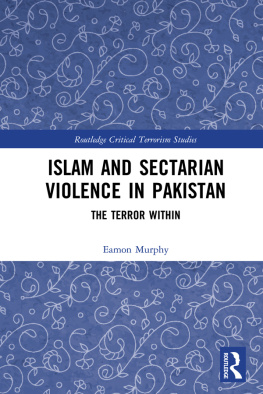Mikkel Thorup - An Intellectual History of Terror (Routledge Critical Terrorism Studies)
Here you can read online Mikkel Thorup - An Intellectual History of Terror (Routledge Critical Terrorism Studies) full text of the book (entire story) in english for free. Download pdf and epub, get meaning, cover and reviews about this ebook. year: 2010, publisher: Taylor and Francis, genre: Politics. Description of the work, (preface) as well as reviews are available. Best literature library LitArk.com created for fans of good reading and offers a wide selection of genres:
Romance novel
Science fiction
Adventure
Detective
Science
History
Home and family
Prose
Art
Politics
Computer
Non-fiction
Religion
Business
Children
Humor
Choose a favorite category and find really read worthwhile books. Enjoy immersion in the world of imagination, feel the emotions of the characters or learn something new for yourself, make an fascinating discovery.
- Book:An Intellectual History of Terror (Routledge Critical Terrorism Studies)
- Author:
- Publisher:Taylor and Francis
- Genre:
- Year:2010
- Rating:5 / 5
- Favourites:Add to favourites
- Your mark:
- 100
- 1
- 2
- 3
- 4
- 5
An Intellectual History of Terror (Routledge Critical Terrorism Studies): summary, description and annotation
We offer to read an annotation, description, summary or preface (depends on what the author of the book "An Intellectual History of Terror (Routledge Critical Terrorism Studies)" wrote himself). If you haven't found the necessary information about the book — write in the comments, we will try to find it.
Mikkel Thorup: author's other books
Who wrote An Intellectual History of Terror (Routledge Critical Terrorism Studies)? Find out the surname, the name of the author of the book and a list of all author's works by series.
An Intellectual History of Terror (Routledge Critical Terrorism Studies) — read online for free the complete book (whole text) full work
Below is the text of the book, divided by pages. System saving the place of the last page read, allows you to conveniently read the book "An Intellectual History of Terror (Routledge Critical Terrorism Studies)" online for free, without having to search again every time where you left off. Put a bookmark, and you can go to the page where you finished reading at any time.
Font size:
Interval:
Bookmark:
An Intellectual History of Terror
This book investigates terrorism and anti-terrorism as related and interacting phenomena, undertaking a simultaneous reading of terrorist and statist ideologists in order to reconstruct the deadly dialogue between them.
This work investigates an extensive array of violent phenomena and actors, trying to broaden the scope and ambition of the history of terrorism studies. It combines an extensive reading of state and terrorist discourse from various sources with theorizing of modernitys political, institutional and ideological development, forms of violence, and its guiding images of self and other, order and disorder. Chapters explore groups of actors (terrorists, pirates, partisans, anarchists, Islamists, neo-Nazis, revolutionaries, soldiers, politicians, scholars) as well as a broad empirical source material, and combine them into a narrative of how our ideas and concepts of state, terrorism, order, disorder, territory, violence and others came about and influence the struggle between the modern state and its challengers. The main focus is on how the state and its challengers have conceptualized and legitimated themselves, defended their existence and, most importantly, their violence. In doing so, the book situates terrorism and anti-terrorism within modernitys grander history of state, war, ideology and violence.
This book will be of much interest to students of critical terrorism studies, political violence, sociology, philosophy, and security studies/international relations in general.
Mikkel Thorup is Associate Professor at the Institute of Philosophy and the History of Ideas, University of Aarhus, Denmark.
Series Editors: Richard Jackson, Marie Breen Smyth and Jeroen Gunning
University of Wales, Aberystwyth, UK
This book series will publish rigorous and innovative studies on all aspects of terrorism, counter-terrorism and state terror. It seeks to advance a new generation of thinking on traditional subjects and investigate topics frequently overlooked in orthodox accounts of terrorism. Books in this series will typically adopt approaches informed by critical-normative theory, post-positivist methodologies and non-Western perspectives, as well as rigorous and reflective orthodox terrorism studies.
Terrorism and the Politics of Response
London in a time of terror
Edited by Angharad Closs Stephens and Nick Vaughan-Williams
Critical Terrorism Studies
Framing a new research agenda
Edited by Richard Jackson, Marie Breen Smyth and Jeroen Gunning
The De-Radicalization of Jihadists
Transforming armed Islamist movements
Omar Ashour
State Terrorism and Neoliberalism
The North in the South
Ruth Blakeley
Contemporary State Terrorism
Theory and practice
Edited by Richard Jackson, Eamon Murphy and Scott Poynting
State Violence and Genocide in Latin America
The Cold War years
Edited by Marcia Esparza, Henry R. Huttenbach and Daniel Feierstein
Discourses and Practices of Terrorism
Interrogating terror
Edited by Bob Brecher, Mark Devenney and Aaron Winter
An Intellectual History of Terror
War, violence and the state
Mikkel Thorup
An Intellectual History of Terror
War, violence and the state
Mikkel Thorup

LONDON AND NEW YORK
First published 2010
by Routledge
2 Park Square, Milton Park, Abingdon, Oxon OX14 4RN
Simultaneously published in the USA and Canada
by Routledge
270 Madison Avenue, New York, NY 10016
Routledge is an imprint of the Taylor & Francis Group, an informa business
This edition published in the Taylor & Francis e-Library, 2010.
To purchase your own copy of this or any of Taylor & Francis or Routledges collection of thousands of eBooks please go to www.eBookstore.tandf.co.uk.
2010 Mikkel Thorup
All rights reserved. No part of this book may be reprinted or reproduced or
utilized in any form or by any electronic, mechanical, or other means, now
known or hereafter invented, including photocopying and recording, or in
any information storage or retrieval system, without permission in writing
from the publishers.
British Library Cataloguing in Publication Data
A catalogue record for this book is available from the British Library
Library of Congress Cataloging-in-Publication Data
A catalog record has been requested for this book
ISBN 0-203-84821-7 Master e-book ISBN
ISBN10: 0-415-57995-3 (hbk)
ISBN10: 0-203-84821-7 (ebk)
ISBN13: 978-0-415-57995-7 (hbk)
ISBN13: 978-0-203-84821-0 (ebk)
3.1 | Sovereignty/reason of state |
4.1 | Conflictuality as seen from the state |
2.1 | Violence to end violence |
2.2 | Political and private violence |
3.1 | Violent actors |
[T]he world that people like me are after is not a world in which people dont kill one another (were not that crazy!) but a world in which murder is not legitimized.
(Albert Camus, November 1946)
What Chairman Krushchev describes as wars of liberation and popular uprisings, I prefer to describe as subversion and covert aggression.
(US Secretary of State Robert McNamara)
Terror attacks. It attacks our bodies. It attacks our sense of security, both as individuals and as societies. The sudden exposure to our profound human vulnerability activates both a sense of fear and horror, terror in its most basic and original meaning, and a desire for action, resolution, re-establishment of an ontological security; a security secure in and of itself.
This book is about what violence, war and terrorism are but mostly about what they do to us and what we, as societies, do with and against them. I want to offer some investigative resources to how violence, especially terrorism, develops in a strained but intense relation to the state and how we as societies, feeling under attack, conceptualize and respond to these attacks. This is not a classical book on the history of terrorism, starting with the Zealots and Assassins, then jumping a couple of thousand years to the anarchists and a twentieth-century succession of the usual suspect, ending up with religious terrorism and al Qaeda. It is not that I take this kind of narrative to be wrong; I use the narratives myself. It is just that I want to problematize the unspoken assumptions guiding that kind of narrative, basically retelling the states story. And I want to situate terrorism within a broader history of violence, rather than to single it out as something separate from the rest of our killings of each other.
In this book, the state is written into the narrative in a hopefully more integrative manner than often seen. Not to expose the state as the real terrorist or anything of that kind or to morally equalize the state and its violent challengers, but because the basic argument of my book is that the state form determines its challengers. Not in a conscious or intentional way but the state form and self-description describes and creates its own challengers both by having developed into the hegemonic definitional center of descriptions and by being the overwhelmingly most important obstacle and object of desire for violent challengers. The state, then, is the privileged descriptor and all-important center of attention. Changes in how the state organizes, describes and legitimates itself will have profound consequences for how it conceptualizes challenges and how it can be fought, both legitimatorily and violently.
Font size:
Interval:
Bookmark:
Similar books «An Intellectual History of Terror (Routledge Critical Terrorism Studies)»
Look at similar books to An Intellectual History of Terror (Routledge Critical Terrorism Studies). We have selected literature similar in name and meaning in the hope of providing readers with more options to find new, interesting, not yet read works.
Discussion, reviews of the book An Intellectual History of Terror (Routledge Critical Terrorism Studies) and just readers' own opinions. Leave your comments, write what you think about the work, its meaning or the main characters. Specify what exactly you liked and what you didn't like, and why you think so.

